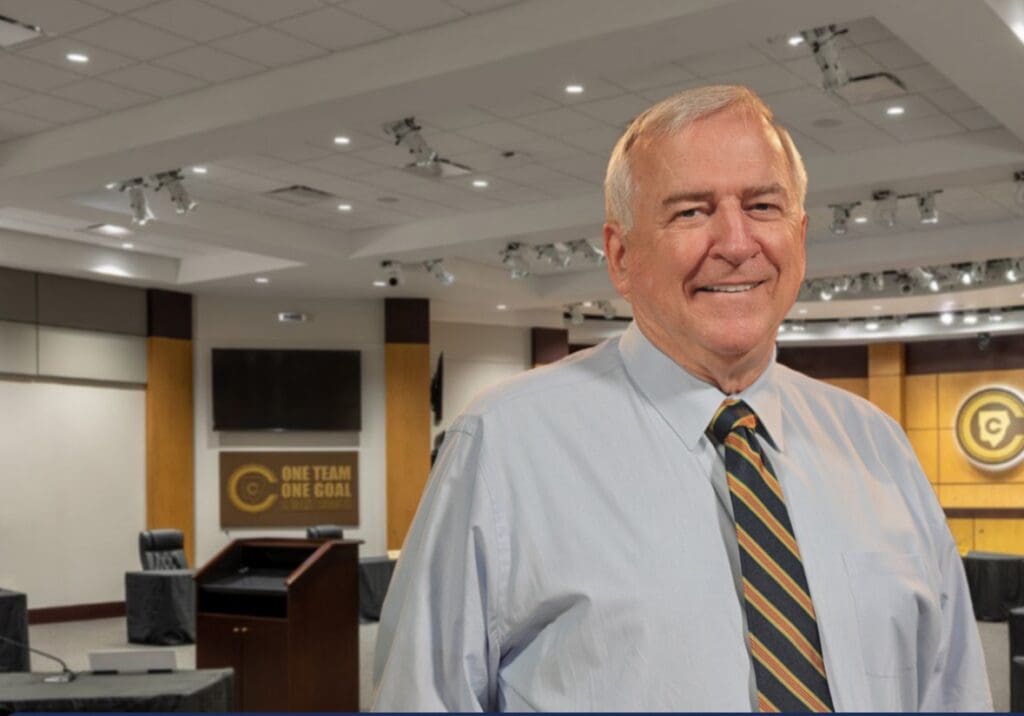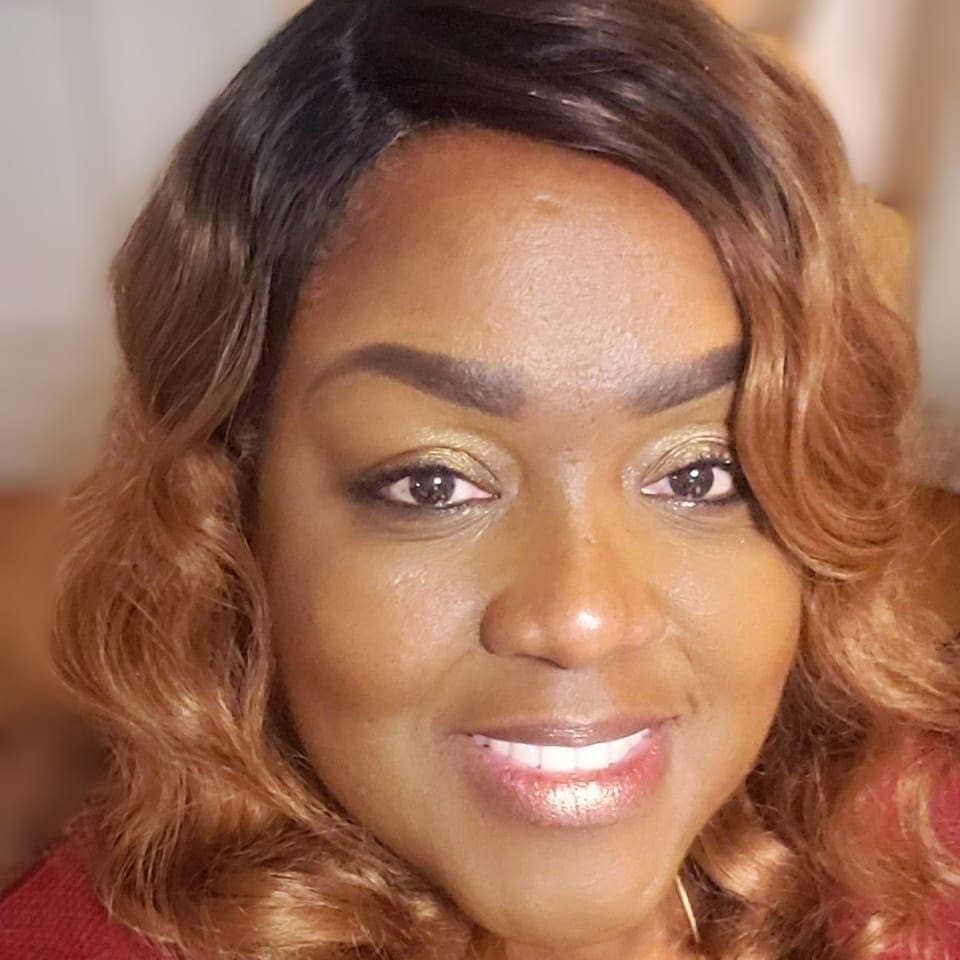By Rebecca Gaunt
Republican Randy Scamihorn, the current board chair, is aiming for a fourth term on the Cobb County Board of Education, but will first have to face Democratic challenger Vickie Benson at the polls in November.
Both candidates completed an email questionnaire. Answers are published as submitted.
The election is scheduled for Nov. 5. Allatoona, Kennesaw Mountain, and North Cobb High Schools are within the boundaries of Post 1.
Randy Scamihorn

Age: 74
Family: Wife, Debbie (married 54 years) 2 adult children (daughter currently a Cobb County School teacher)
How long have you lived in Cobb: 46 years
Profession: Retired teacher/Administrator; Retired Military Officer
Volunteer/community service:
Served on Georgia Governor’s Education Advisory Board
Georgia Education Coalition
Georgia School Board Association
Cobb County School Board; .
Georgia Retired Educators Association
Cobb Republican Party
US. Air Force Association
Georgia Industrial Education Association
Academy of Model Aeronautics
Website: www.Randy4Schools.com
Vickie Benson

Age: 59
Family:
I’m married to Lee, one daughter Nikki, and two grandsons. I have several family members that reside in Cobb.
How long have you lived in Cobb: I have lived in Cobb for 11 years
Profession: Currently I am a 26-year veteran educator. I teach Science and I am a National Certified STEAM Specialist
Volunteer/community service: Board Member at Cobb Community Alliance to Prevent Substance Abuse (CCAPSA), Mentor with Destiny Daughters of Promise (DDP), and former Vice President of Membership of Cobb Democratic Women (CDW)
Website: drvickiebensonforccsbpost1.com
What are the District’s biggest strengths?
Scamihorn: Our schools are in great demand, as evidenced by the large number of families that move to Cobb each year. Parents have choices and they choose Cobb because of our schools, it’s as simple as that. And that’s thanks to the quality of our teachers, Superintendent Ragsdale and his staff. The evidence is seen in how our students rank on numerous benchmarks like SAT/ACT, Georgia Milestones, scholarship totals, the number of students who enter college and trade schools, and the value of homes across Cobb which is directly tied to our schools.
Benson: As a former educator of Cobb County School District and a grandmother who follows my grandson’s academic achievement, I know that the biggest strength that Cobb district has is academics. Students are eager to learn but learning by doing. The only way that academic achievement continues is to ensure that students are receiving adequate resources, equitable funding across the district, safety and healthy protocols that must be enforced, and provided well-being programs that include physical, emotional, and mental health for students, teachers, and staff. Teachers must be supported with job security and must be able to work stress free. However, they must be supported from all district levels which include the school board. Kudos to the teachers for making sure our children are learning.
Cobb County School District has a very condensed timeline for budget approval. For example, in 2024, the budget was given to the board hours before the first legally-required public hearing. The second required public hearing will be held directly before the vote takes place. Other metro school districts spread the process out, separating the budget introduction, public input sessions, and vote. Do you believe CCSD provides sufficient time to receive and consider feedback, or would support revising the schedule?
Scamihorn: Yes, definitely, it’s sufficient. Citizens and the Board have lots of opportunities to give feedback, anyone who tells you differently simply doesn’t like decisions after they’ve given their feedback. I must also correct the misconception that Cobb County’s massive budget is built in short order. Rather the budget presentation seeking approval is the final step in a year- long (plus) process where schools and departments make the Superintendent aware of the “needs and wants” of Cobb’s students and families. Then the “needs and wants” are analyzed at many different levels and prioritized by the Superintendent, based on what students need the most. There’s another misconception which I suspect some intentionally like to spread, that Cobb’s neediest students don’t receive the same opportunities as other students. That’s simply not true. As a matter of fact, Cobb’s highest-need schools get, by far, more money than other schools across Cobb because the Superintendent bases “needs and wants” on the needs of students. And although this is more detail than you have space for, no, that’s not only because of Title One funding, as some would tell you.
Benson: The schedule should be revised to allow ample feedback from the public, the school district, and fellow leaders. Most school budgets force a discussion that accompany a process that provides an opportunity to justify the collection and expenditure of public funds. Cobb should have a budget plan for the upcoming school year that must include a strategic and equitable funding for all schools. Therefore, the introduction of the budget if presented in the right manner will help bridge the gap between district’s stated goals, resource allocation, as well as ensuring transparency and accountability for spending.
Documents from an open records request showed that district employees engaged in an attempt to prevent critics from speaking at the September 2023 meeting by moving the line for public comment. Documents also showed they discussed preventing a student who had written an op-ed for the AJC from speaking. Do you have any concerns about the conduct of the employees who were involved in those Microsoft Teams exchanges?
Scamihorn: Well, that’s one perspective which, factually, isn’t correct. I welcome the views of all stakeholders in our public comment section, even those that we might not agree with on occasion. And, we’re in the middle of running a business meeting for all students, staff, and parents in the county. There’s a way to be part of the conversation and to actually be heard and that means following policy and being orderly and safe. If it does, great! We want to hear what everyone has to say. If it doesn’t, staff will make sure it is, as they should. Civil feedback is what our democratic form of government is built upon – not being disruptive, unsafe, or attacking people, especially not veteran educators, personally. We might not all agree on all decisions, but we should all be able to agree we want what’s best for children, not the ridiculousness from across the country that we’ve seen in Cobb recently.
Note: Due to his characterization of the question as factually incorrect, the Courier sent a follow up question regarding the open records request asking for an explanation for the Microsoft Teams messages exchanged by Chief Strategy and Accountability Officer John Floresta and members of the communications team that were made public. Scamihorn declined to answer. The Courier reported on those messages here, here, and here as did the Atlanta Journal-Constitution. Also see editorials in the Marietta Daily Journal and the AJC. Cobb Community Care Coalition, the group behind the records request, has posted several of the staff exchanges on its website. The Courier reviewed the records independently in full and stands by its reporting.
Benson: Employees should be very careful of violating the First Amendment rights or principles of others. Shutting down or silencing speakers because they have a different viewpoint should not have to be adhered to what others are feeling or believe. This is a free society, and everyone have a voice of opinion.
To Scamihorn: You voted in favor of building the $50 million event/multi- use center. What makes the facility a positive investment for the district, in your opinion?
Scamihorn: Cobb County is a school system that is recognized as one of the best in the state and nation and sets the ‘pace’ for all districts. This question reminds me of the questions we received about other facilities that set us apart, like the Cobb Innovation and Technology Academy (CITA) at Osborne and the newly announced second CITA on Allatoona’s campus. Sometimes people don’t like progress until they see it and that will be the case again here as we build an event center for multiple uses and is another decision that sets our district apart. The center was approved by six of the board members, with only one member opposed which was refreshing. I am grateful almost everyone on the Board can see the value for students and staff during the year and families at graduations.
To Benson: Would you have voted in favor of the $50 million event/multi-use center?
Benson: If the $50 million was not in the budget plan for the year to be used for an event/multi center, I would not have agreed to spending the money on this facility. I am sure there are other ways that this amount of money could be used to address the needs of the students. Writing a grant or fundraiser to build a $50 million dollar building would have been more adequate and feasible.
To Scamihorn: You have stated that you will not support “educational fads” in schools. What fads are you most concerned about keeping out of Cobb’s classrooms?
Scamihorn: Oh, that’s an easy one, anything that takes away from students’ and teachers’ time in the classroom on core academics. Our students are not guinea pigs for products or curricula that some company tries to sell to public schools across the country. That’s not going to happen here in Cobb. Another example is the sexually explicit materials the Superintendent has been removing from our schools as they’ve been found. Our teachers must focus on teaching, not social decisions which should be made by parents.
To Benson: You told the Marietta Daily Journal that you intend to create an advisory committee. Can you elaborate on the purpose of the committee?
Benson: The purpose of an advisory committee will allow for reviews of the district’s criteria and implementation of the school’s implementation/Accountability plan.The committee can also discuss ideas and issues relating to budgeting, funding for schools, exploring vetting that may be controversial. This way research or controversial ideas and specific topics can be supported from professional input. In other words, an open agenda with our constituents helps board members to make better decisions for the school district.
What have I not asked that you would like to address?
Scamihorn: Why do I believe I am the best candidate for the job? I know Cobb County, I own a home here, I live in northwest Cobb every day, I shop at our stores, I know this community and what it needs. My opponent spends her days in Alabama where she works over 2 hours away (one way) and seemingly co-rents a home in Alabama with a family member. My opponent works for a distant Alabama school, far beyond Columbus Georgia, and might know what’s going on in east Alabama but she doesn’t know Cobb. I am the only candidate who actually has invested my life in our community, lives with my kids and grandchildren here in Cobb, knows what northwest Cobb needs and wants, and will fight for it.
Benson: How can we improve our relationship with the school community and families? It starts with school-community and Interagency partnerships. At some point CCSB must address the needs of the students first. There are six strategies that work in any school district, “Positive Actions” is key. This includes strengthening academic motivation where there is a lack, supporting families and communities (Decreased enrollment during the pandemic. Where are the 5,000 students? No one asked or seemed to investigate why these students did not return to school.), improving school climate (consistency on every level including equity), improving mental health (every student, teacher, and staff should have access to free programs) and eliminating bullying and school violence (Use the Safe School Plan provide by the Georgia State Department of Education with assistance to develop the plan with the Georgia Emergency Management Agency/Homeland Security).
